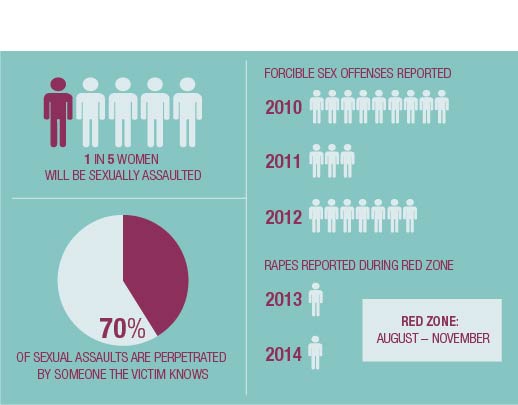The first few months of the fall semester, from August to November, is referred to as the “Red Zone,” a period when sexual assaults are more likely to occur on college campuses.
In a 2013 research study, the majority of women who responded reported they were intoxicated at the time of an unwanted sexual experience.
“Consuming alcohol does not cause rape,” Kathy Echols, staff therapist at the Women’s Resource Center, said. “However, because a person becomes less inhibited when drinking, perpetrators may take advantage of their victim’s vulnerability.”
According to crime statistics gathered by the University of Alabama Police Department in 2010, nine forcible sex offenses were reported. In 2011, there were three, and seven occurred in 2012.
One rape was reported during the Red Zone of 2013, and there has been one rape reported for the 2014 Red Zone as of September 18.
UAPD was unable to comment on the Red Zone.
The Women’s Resource Center, a service providing aid to victims, offers free and confidential counseling to students and faculty at the University who have been victims of violent crimes. The WRC can also counsel the victims’ family and friends who have been affected by the victims’ experience.
“We serve as advocates,” Echols said. “With the client’s written consent, we can help navigate through certain systems, such as legal and academic. If a student has missed class or assignments because of the assault, we can speak with professors. We can also help victims reach out to community resources to help them on their way to recovery.”
The WRC has a victim advocate who is available 24 hours. A victim of assault can call the advocate at any time and the advocate can go to the hospital with the victim and accompany victims to the police station if they want to report the crime.
Echols said the WRC has followed many clients through the whole process of reporting the crime to prosecution in court.
“We try to make sure that the WRC is a comprehensive service,” she said. “And as long as a client is affiliated with the University of Alabama, we can continue to see them.”
Because statistics show 70 percent of sexual assaults are perpetrated by someone the victim knows, the Safer Living Guide offered by the UAPD urges students not to accept a date or go to an unfamiliar place with someone they do not know well.
In order to protect themselves from being drugged with Rohypnol, or “roofied,” students are urged to not leave their drinks unattended at parties and to only consume beverages they have prepared themselves.
In case of assault, the victim can report the crime to UAPD, if the assault occurred on campus, or Tuscaloosa Police Department, if the crime occurred off campus. The victim can also report the crime to the Office of Student Conduct or the WRC if legal action is not going to be taken.
Zoe Storey, peer education coordinator at the WRC, speaks to a variety of classes and student organizations about the services the WRC offers.
“Many of the speaking engagements the WRC participates in are requested by a particular student organization or class,” Storey said. “But in addition to those speaking engagements, the WRC hosts many events throughout the year.”
Further information on these events, as well as information on how to book a speaker, can be found on the WRC website .
Like many college students, Kali Stanton, a freshman majoring in accounting and business management, has strategies to avoid assault.
“I try to stay indoors within a reasonable time period,” she said. “I also make sure that my friends are aware of where I am.”









